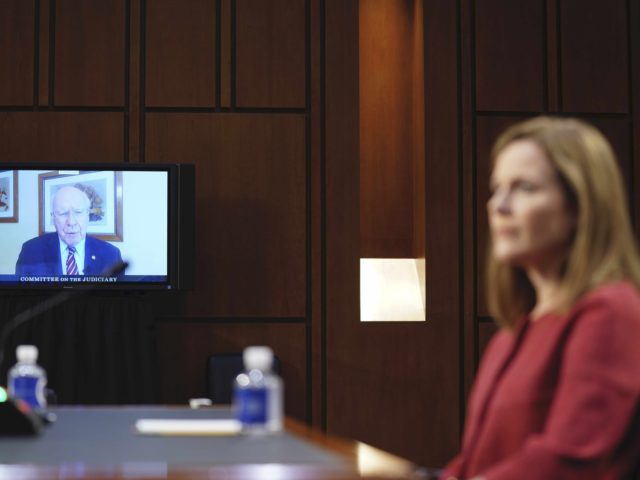CLAIM: Amy Coney Barrett “laid out the case for blocking” Judge Merrick Garland’s confirmation to the Supreme Court in 2016.
VERDICT: FALSE. Sen. Patrick Leahy (D-VT) misquoted Barrett — and she fact-checked him on the spot.
Sen. Leahy claimed during Judge Amy Coney Barrett’s Supreme Court confirmation hearing at the Senate Judiciary Committee on Tuesday: “You laid out the case for blocking President [Barack] Obama’s Supreme Court nominee, Judge Merrick Garland, for ten months during an election year.”
Barrett corrected him.
Senator Leahy, I want to be very clear. I think that’s not quite what I said in the interview. It was an interview that I gave shortly after Justice Scalia’s death, and at that time both side of the aisle were arguing that precedent supported their decision. And I said while I had not done the research myself, my understanding of the statistics was that neither side could claim precedent, that it was a decision that was the political branch’s to make. And I did not say which way they should go. I simply said it was the Senate’s call. I didn’t advocate, or publicly support, the blockade of Judge Garland’s nomination, as you’re suggesting.
Leahy countered by saying Barrett had said the replacement of conservative Justice Antonin Scalia with a liberal justice would not be a “lateral move.”
Barrett replied: “What I was suggesting is that it was unsurprising that there was resistance, as a political matter, to that nomination because it would change the balance of the Court.”
She added that she had “full respect for Judge Garland.”
The record confirms Barrett’s version of events.
As CBS News noted last month, Barrett said in a 2016 interview about the Garland controversy that there was no clear precedent in a case where a Senate controlled by the opposing party would confirm, or decline to confirm, a Supreme Court nominee.
“The question is: what does this precedent establish? And I don’t think it establishes a rule for either side in the debate,” she said.
She also said: “It shouldn’t be a surprise that the Senate is willing to push a president’s nominee through in an election year when they share the same political affiliation.”
The one exception, she noted, was Anthony Kennedy, who was nominated in unusual circumstances. Before that, she said, there was another exception in the 1880s.
“The reality is, we live in a different time,” she said, noting that confirmation hearings had become more contentious since Senate Democrats — led, in part, by then-Senate Judiciary Committee chair Sen. Joe Biden (D-DE) — had blocked the nomination of Robert Bork in 1987.
“The president has the power to nominate, and the Senate has the power to act, or not, and I don’t think either one of them can claim that there’s a rule governing one way or the other,” she concluded.
The “Scalia seat” that Garland was supposed to have filled was eventually filled by Justice Neil Gorsuch, President Donald Trump’s first Supreme Court nominee.
Joel B. Pollak is Senior Editor-at-Large at Breitbart News and the host of Breitbart News Sunday on Sirius XM Patriot on Sunday evenings from 7 p.m. to 10 p.m. ET (4 p.m. to 7 p.m. PT). His newest e-book is The Trumpian Virtues: The Lessons and Legacy of Donald Trump’s Presidency. His recent book, RED NOVEMBER, tells the story of the 2020 Democratic presidential primary from a conservative perspective. He is a winner of the 2018 Robert Novak Journalism Alumni Fellowship. Follow him on Twitter at @joelpollak.

COMMENTS
Please let us know if you're having issues with commenting.